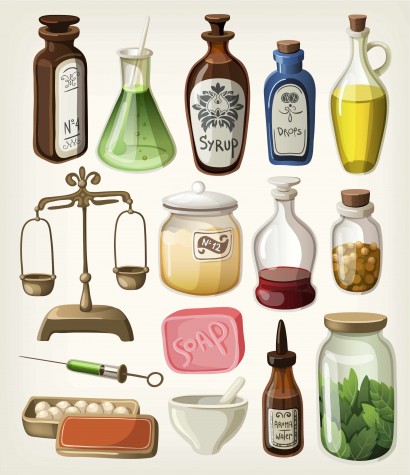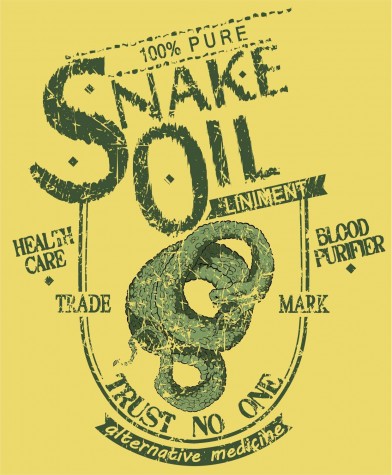 The other day I was walking home and I noticed that the local herbal remedy place in the neighborhood had closed down. It was a cheery place, with pictures of flowers on the windows, and often a pretty girl outside to lure in customers. It may have been a tad corporate-looking but I never really thought of it as evil.
The other day I was walking home and I noticed that the local herbal remedy place in the neighborhood had closed down. It was a cheery place, with pictures of flowers on the windows, and often a pretty girl outside to lure in customers. It may have been a tad corporate-looking but I never really thought of it as evil.
“I have a perverse sort of glee knowing that place is shutting down,” my wife whispered as we walked past.
I knew what she meant. The place, called Club Naturista Alecos, sells a tincture “derived from indigenous herbs” that “acts as an internal and external cleanser” and “is the most amazing product in the world” that “greatly helps the health of all people.” “Snake oil” doesn’t appear in their pamphlets but it’s pretty well implied.
 Places like these are common among all social strata here in Mexico and most of the time, I think of them as pretty harmless. My wife, who works for a development agency that combats poverty and violence, is less forgiving. She’s sees hucksters like this as bilking poor people out of their life savings. And in many cases, she has a point. In some poorer neighborhoods in the north, bizarre “flower therapy” centers have popped up selling flower-based remedies that claim to cure all manner of problems from guilt to apathy to something called “selfish, possessive love.” I assume that has something to do with an uncontrollable need to own the new iPhone 6.
Places like these are common among all social strata here in Mexico and most of the time, I think of them as pretty harmless. My wife, who works for a development agency that combats poverty and violence, is less forgiving. She’s sees hucksters like this as bilking poor people out of their life savings. And in many cases, she has a point. In some poorer neighborhoods in the north, bizarre “flower therapy” centers have popped up selling flower-based remedies that claim to cure all manner of problems from guilt to apathy to something called “selfish, possessive love.” I assume that has something to do with an uncontrollable need to own the new iPhone 6.
Snake oil remedies are as old as remedies themselves – far older than modern medicine or even Hippocrates. So if they are all bunk, how have they survived so long? I address this question in the current issue of Discover Magazine in a story called “Why Nothing Works.” In it, I look at the mysterious placebo effect, which it turns out is less mysterious than it used to be. In fact, we know a lot these days about how belief affects your brain and body.
For instance, we know the placebo effect does not affect everybody equally nor does it affect every disease the same. For instance, it can be very impressive against things like depression, pain, and irritable bowel syndrome. We know it can activate the immune system (at least in rats) and relies heavily on dopamine systems in the brain. We also know that not all placebo experiences activate the same brain pathways.
So what does this mean? Well, it means “all in your head” is not always all in your head. Scientists say some placebo effects are the product of very real chemicals in the brain, just as sure as if you shot them into your veins. Scientists even have a catch phrase for it – the internal pharmacy.
 So if you buy a placebo – be it ginseng, aura cleansing, or homeopathy – you might actually be releasing honest-to-god drugs into your body. Chances are that the effects will be temporary but I don’t think the book is closed on that one yet.
So if you buy a placebo – be it ginseng, aura cleansing, or homeopathy – you might actually be releasing honest-to-god drugs into your body. Chances are that the effects will be temporary but I don’t think the book is closed on that one yet.
So what’s your placebo strategy? For instance, I use several placebos regularly. One is the packet of Airborne on hand in the bathroom to supercharge my immune system with its special patented 17 vitamins and minerals. Does it actually do anything? Sure, it fizzes when I drink it.
Another is a trick my buddy taught me. Take a clove of raw garlic and chew on it. Don’t spit it out – just chew and get it down. He says it “reboots” the immune system (it definitely reboots something – kids, don’t try this at home). The trick to placebos seems to have something to do with their presentation and the story that goes along with them. Not only does “reboot” resonate with me but the shot of raw garlic that knocks me on my ass feels like it’s doing something. After that, the garlic itself hardly matters.
So what’s the harm in a little self delusion? As near as I can tell, there are two common places where modern snake oils turn a little evil. The first is promising that placebos can treat life-threatening problems. For instance, placebos are very effective against many of the symptoms of cancer – pain, nausea, lethargy – but not against the actual tumor itself. Making someone think that a placebo can kill cancer wastes precious time.
The second is when it breaks the bank. Last year I visited a traditional witch doctor in Eastern Mexico for a “cleaning” (brujo – literally witch – is what he called himself but “healer” or “shaman” might be better words in English). It’s a common practice and I went to the most popular guy in town. The cleaning cost about US$40, both for me and for the locals. People in Mexico make an average of US$20 per day and the minimum wage in that region was US$5. Per day.
Now, we live in a pretty affluent part of Mexico City known for cafes and hipsters – think Williamsburg in Spanish with a lot fewer beards. I don’t think anyone is going broke on natural indigenous herbs here. People eat right, jog in the morning, and occasionally sample magical tinctures. But when it comes to fooling ourselves, it’s a fine line.
Photo Credit: Shutterstock
Just this very weekend, my sister-in-law showed us an article she’d saved because it was so interesting. It was about why nothing works. “That’s a wonderful subject,” I said. “Who’s the author?”
I’d argue there’s a third place where snake oils turn a little evil. Trust is a very important part of the relationship between patients and medical professionals. People generally expect that doctors, nurses, pharmacists, or people placing themselves playing similar roles, aren’t practicing the art of deception. So that would mean snake oil sellers have an obligation to tell their customers that they’re selling placebos. Since that would kind of defeat the point of the placebo in the first place, that’s not something that sellers are normally willing to do. That’s a big ethical problem.
Totally agreed, and I live in Mexico too. I think faith is very powerful and risky at the same time.
The two little evils you name are certainly problematic. Also, what of over-the-counter availability of antibiotics–is that still the norm in Mexican pharmacies? I’ve known people who buy antibiotics OTC and pop them at the first cold symptom. Of course, loss of effective antibiotics is another story all on its own, with global ramifications. But back to snake oil, I am dismayed by a third placebo evil–the use of endangered animal parts and substances (e.g. Rhinoceros horn and bear bile) to “treat” human ailments.
Nice piece Erik, thanks for sharing!
In response to Sean’s comment on deceptiveness by medical professionals — I agree. I get all riled up when I see businesses claiming to be pharmacies stocking placebos on their shelves all mixed in with the real medicine. I don’t necessarily have as much of an issue with a chiropractor trying to cure someone with “cold light therapy” (for serious) as I have with a purported pharmacy stocking a display of airborne right by the registers.
These promising tinctures are no different than what pharmaceutical companies and doctors prescribe. Sure they warn you of the dozens of side effect a drug may have on you however, no one takes the time to treat the individual and get to the bottom of the ailment. It’s all about the bottom line and creating a quick fix for the customer or client. The patient no longer exhist as an individual, thus the medicine of healing is no longer a priority. It’s a shame.